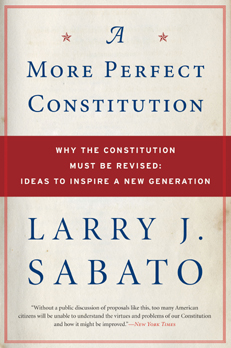

 A More Perfect Constitution
A More Perfect Constitution“This book will ask readers to set aside their own political loyalties, to look past the current ‘values’ debates and hot-button issues, to consider this very real possibility: that the failure of the nation to update the Constitution and the structure of government it originally bequeathed to us is at the root of our current political dysfunction.” —Larry Sabato
Read the 23 proposals from Sabato’s A More Perfect Constitution
Early supporters of A More Perfect Constitution
More and more, we are aware of the growing dysfunction and unfairness of our
political system. Partisan gridlock dominates Washington; 17 percent
of voters elect a majority of senators; the presidency has assumed
unprecedented and unintended powers; politicians spend as much time
campaigning for office as governing; and average Americans feel more and
more disconnected from the political process—half or more don’t even vote in
many elections. All of this would have horrified the likes of Jefferson and
Madison.
In A MORE PERFECT CONSTITUTION, Larry Sabato persuasively argues that, while
much of the Constitution should remain sacred, some crucial revisions are
essential to restore equity for ordinary citizens, for until some of its
outmoded provisions are reformed, we will continue to have more of the same
political stagnation. Indeed, the inspiration for these reforms comes
from the original framers—Jefferson, Madison, Mason, Washington, and
others—who fully expected the Constitution would, and should, be regularly
revised each generation to reflect the country’s changing needs. Yet,
apart from the ten amendments in the Bill of Rights, it has only been
amended seventeen times in 220 years, and many of those amendments were
inconsequential.
A MORE PERFECT CONSTITUTION presents twenty-three creative and dynamic
proposals to reinvigorate American governance. Combining idealism and
pragmatism, Larry Sabato's thought-provoking ideas range from the structure
of Congress, and length of the president’s term to the number and terms of
Supreme Court justices, the vagaries of the Electoral College, and a
compelling call for universal national service—all laced through with the
history behind each issue and their potential impact on the lives of
ordinary people.
In presenting his proposals, Sabato provides an invaluable civics lesson,
peeling back the roof covering the workings of our political system, and
allowing us to see the gears and levers meshing together; to see what parts
of the machine need oil, and what parts need full-scale repair—and to
understand why. We therefore come to appreciate, over and over, what
the founders of our system expected, as expressed in their own words—that
the Constitution would be revised generation by generation, updated to
fulfill the needs of a growing nation.
Larry Sabato has the rare skill of making political science appealing and
understandable to the masses. This no doubt comes from his thirty years in
the classroom, where he has developed one of the most fertile and insightful
political minds in the country. This book is, in many ways, the
summation of his thinking on our political system during those thirty years.